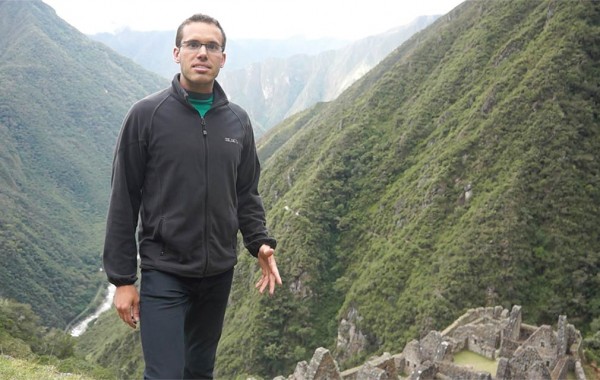
Brent Smith ’06
In his irreverent documentary SICKCARE, Brent Smith ’06 pays a visit to the zoo. The camera focuses on a “Don’t feed the animals” sign, and it’s noted that parents warn their children not to throw potato chips and candy to the animals because it’s “human food.” But is it, really? That’s the question Smith poses to point out just one problem with Americans’ lifestyles.
“We’ve learned that in order for animals to be healthy, we have to feed them natural diets, provide them with activity, and give them regular medical check-ups,” Smith narrated. “So if we know this is the right thing to do for animals, when are we going to start being humane to humans?”
SICKCARE is full of biting satire on the ways our political and economic systems actively encourage unhealthy lifestyle choices, then ask employers or the government to foot the bill when we get sick. Take Smith himself: In college, he weighed as much as 230 pounds. As a defensive end for the Raiders football team, that extra mass served him well on the line of scrimmage, but it cost him off the field.
Just a year after graduating, he was diagnosed with metabolic syndrome, which often leads to heart disease, diabetes, and stroke. Smith was shocked. He’d been an athlete all his life. His eating choices didn’t seem so unhealthy, either. “I wasn’t doing anything different than your typical American,” he said.
Smith had recently started a job at the health insurer Cigna (where he still works as a benefits consultant), developing employee wellness strategies. Those strategies, Smith realized, work best when they counter the incentives that lead to most Americans’ lifestyles — sitting most of the day; eating fatty, sugary, and processed foods; and seeking medical care only once the effects of that lifestyle get out of hand.
“We’re spending a lot of money pulling people out of the water when they’re drowning, but we’re not doing a very good job of keeping people from falling in the water in the first place,” he said. “We have a ‘SICKCARE’ system.”
This insight motivated Smith to pursue a passion for amateur filmmaking that he’d been harboring since Colgate. As a final project for Race, Language, and Ethnicity: From Emancipation to Hip Hop Nation with Professor Kermit Campbell, Smith and some friends had produced their own rap video. Now, with a (literally) killer idea, he saw an opportunity to make something bigger. With collaborator Duncan Quirk ’06, he jumped right in — at first just interviewing people at health care protests with little idea of what his finished product might look like.
Over several years, Smith picked up footage wherever he traveled — from a Detroit classic car show to Machu Picchu, New York City to the Hoover Dam. And he knew people would be more likely to learn and accept the message if the film were entertaining. So, he filled SICKCARE with many lighthearted sequences, including a bit where Tommy Casano ’06 portrays heart disease and tries to hunt Smith down to kill him. The result is a rollicking yet informative introduction to the perils of an unhealthy lifestyle.
Smith released the full 56-minute version on Vimeo in 2014. It includes interviews with Harvard professor Deidre Barrett, author of Waist Land: The R(E)volutionary Science Behind Our Weight and Fitness Crisis. Many of SICKCARE’s arguments reflect Barrett’s focus on evolutionary science as a guideline for healthy eating and living.
When he premiered the film in Chicago earlier this year, Smith donated all proceeds to the nonprofit organization Growing Home, which promotes organic food operations on the South Side of Chicago, an area with a fair amount of poverty. “If you don’t have money, you have to eat what’s cheap,” Smith said, “and what’s cheap is unhealthy.” The premiere raised more than $2,000. It’s just the beginning of what he hopes will be lasting impact of his film.
— Mike Agresta






